
- Great Visions TV
- Inspirations
- Media
- Possibilities
- Astrophysics, Quantum Physics & The Nature of Reality
- Deconstructing Nuclear Fission & Nuclear Waste
- Defense Industry as Community Builders
- Defense Industry As Energy Providers
- Global Water Shortages
- Innovative Technology
- Intelligent Communities
- Pentagon & Non-Western Nations
- Recreating
- Resource Based Population
- Sharing Community Resources
- Protecting Human Rights
- Spiritual Ecology
- Syria
- Write to Us
Embrace Foundation International
Embrace Foundation is a non-profit, educational foundation set up to create better understanding between people of different religions, cultures, traditions and world philosophies.
Embrace Foundation works to bring leaders and scholars of world-wide religions, cultures and philosophies together by sponsoring forums, seminars, lectures and developing an international exchange program. Embrace Foundation is particularly concerned with reaching the world public through the media.
Embrace Foundation works to bring leaders and scholars of world-wide religions, cultures and philosophies together by sponsoring forums, seminars, lectures and developing an international exchange program. Embrace Foundation is particularly concerned with reaching the world public through the media.
Purpose
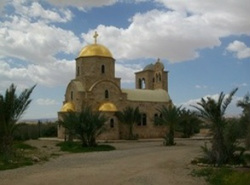
Donations
Embrace Foundation is an all volunteer organization. All donations go directly to programs.
Embrace Foundation does not and has never given permission to any outside organization to solicit or receive contributions on our behalf.
All donations should be made to Embrace Foundation only via Paypal or by mail. All donations are tax deductible. A receipt will be emailed to you. Please click on the Pay Pal link below to Donate.
Embrace Foundation does not and has never given permission to any outside organization to solicit or receive contributions on our behalf.
All donations should be made to Embrace Foundation only via Paypal or by mail. All donations are tax deductible. A receipt will be emailed to you. Please click on the Pay Pal link below to Donate.
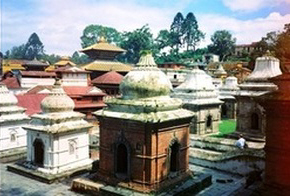
Travel As An Interfaith Act
Embrace encourages all who can do so, to learn about other traditions and cultures by traveling as “Grassroots Diplomats.” We hope that people every where become life long students of our world-wide humanity.
“ In every man there is something wherein I may learn of him, and in that I am his pupil.”
R.W.Emerson
“ In every man there is something wherein I may learn of him, and in that I am his pupil.”
R.W.Emerson
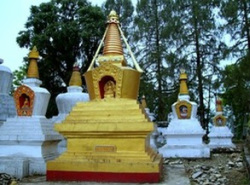

Embrace Humanity
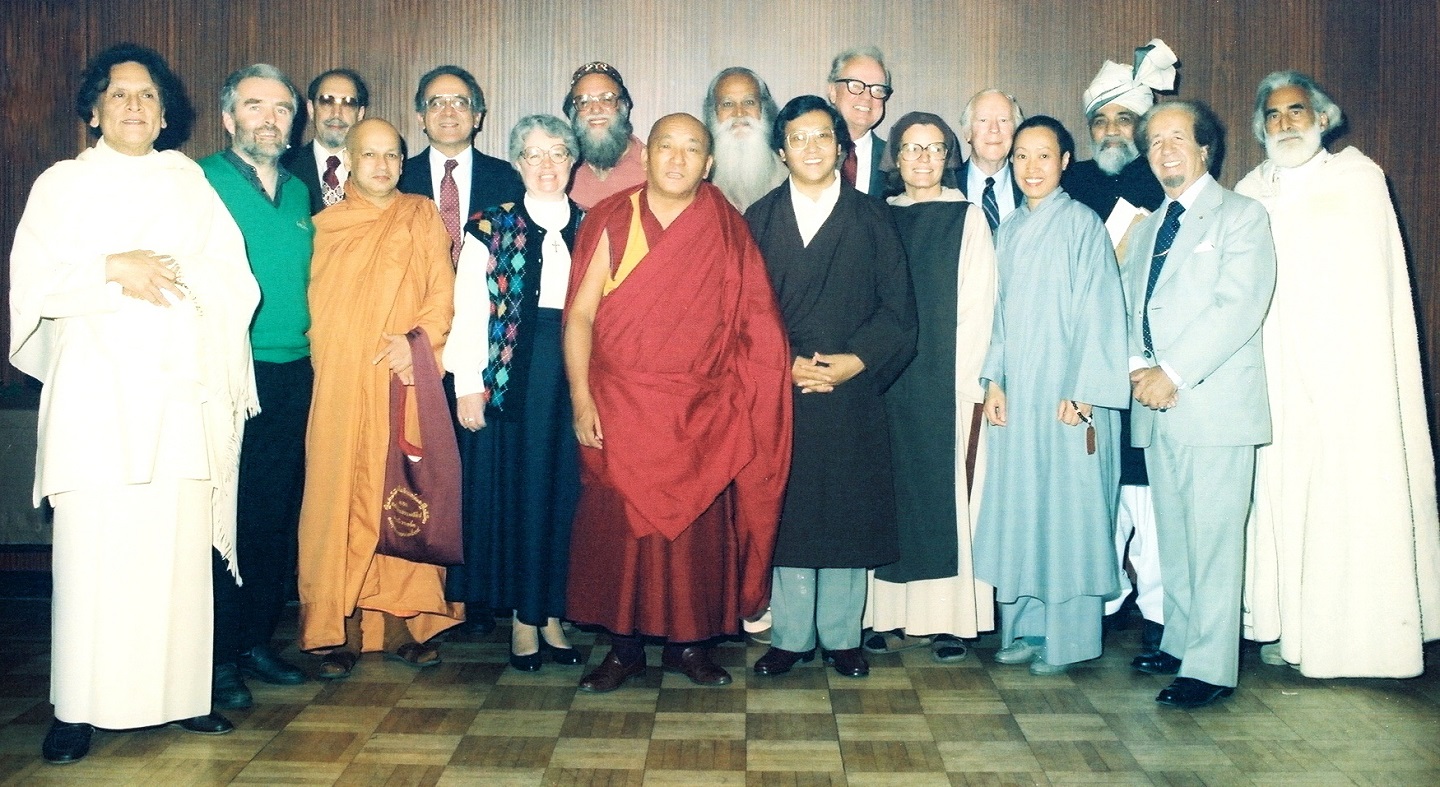
Great Visions - TV
Guests are: Swami Satchidananda &
the Rt. Reverend Dean Parks Morton
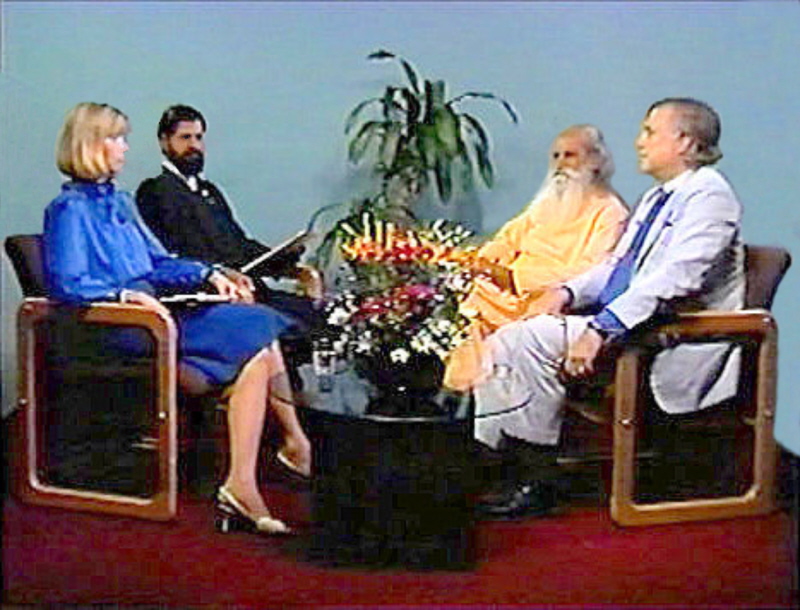
Embrace Archives
Thank you for making a donation.
TRAVELING IN SOUTH AFRICA - 2020
Swami Satchidananda, Pir Vilayat & Ajata
TRAVELING IN SOUTH AFRICA
Travel in South Africa offers a remarkably beautiful tapestry of diversity in both people and landscape. Due to having to change their itinerary because of COVID, The Embrace Founders spent most of their time in visiting outlying areas of Durban and traveling in Zululand.
They had hoped to see the Venda people in Limpopo (Northern-Eastern) South Africa. The remotely located Venda were largely overlooked by the Apartheid government and so have retained many of their traditional beliefs and culture which extends even over the border into Zimbabwe.
Important to Understand: Most African tribes were divided by arbitrary borders drawn up by colonial occupiers. So that is why most tribes, among them: Venda, Oromo, Yoruba, Shona, Hausa etc. are spread throughout numerous countries on the continent of Africa.
Ajata and Virginia had also hoped to visit the Xhosa people. Ex-President Nelson Mandela originally came from the Xhosa ethnic group, before becoming Father to the “Rainbow Nation”. The Xhosa live mainly in the Eastern Cape Province.
Perhaps most importantly, the Embrace Founders had especially planned and hoped to see the home of Nelson Mandela, St. Mary’s Cathedral where Bishop Desmond Tutu was Dean and Vusamazula Credo Mutwa’s cultural sculpture garden in Soweto.
HISTORICAL OUTLINE
Most people in South Africa speak English as well as, a tribal language or Afrikaners (the language of the descendants from the Netherlands who for the most part created the Apartheid government.) The British colonialists once tried to defeat the Boers (descendants from the Netherlands), but failed. Nevertheless, they left a small community of British in South Africa whose members (if they go to church) are distinguished as belonging to the Anglican Church rather than the Dutch Reformed Church. Many, of course not all, (both Christian and Jewish) also contributed to maintaining the Apartheid government. The Oppenheimer’s (Coal, Gold, Platinum & Diamonds - etc.) were among the most deceitful exploiters and oppressors of Black South Africans.
Interestingly, the Oppenheimer family has been hastily re-writing their history on a number of internet venues. The good news is that they are finally liberating billions of their ill-gotten gains for South Africans who are disadvantaged and COVID sick. They need to do a lot more. Reparation payments are in order, as they are in the Holy Land for the theft of Palestinian land, homes and businesses for which the Oppenheimer’s have long supported.
From: THE GUARDIAN
Harry Oppenheimer (Obituary)
David Pallister
Sun 20 Aug 2000
“Industrial baron whose diamond and coal mines stoked the economic engine driving apartheid.”
. . . “Oppenheimer did not stop his duplicity with “liberal” political parties but also funded the “anti-Apartheid” movement through the United Democratic Front (UDF) and Urban Foundation[4] while a trustee at South Africa Foundation which funded various propaganda schemes for the Apartheid government in places like the United States[5] as a way of promoting Apartheid as “socially acceptable”.
But throughout his stewardships of South Africa's largest conglomerate - worth more than 50% of the Johannesburg stock exchange - conditions in the mines for migrant black workers were overcrowded and brutal; wages hovered around the poverty line and racism among the white managers was the norm.”
www.theguardian.com/news/2000/aug/21/guardianobituaries.davidpallister
THE ZULU CULTURE
The Zulu people have a major population in South Africa which is estimated at about 10-12 million. It was a pleasure experiencing just a very few of their spiritually/ culturally cherished places, including the King Shaka Visitors Center in KwaDukuza which has the memorial of King Shaka. Especially, enjoyable was meeting a few of the young guides at these locations. King Shaka Zulu was killed on 24 September 1828 by two of his brothers. He was sitting on a rock when they assassinated him and then later they threw his body into an empty grain pit. The Zulu Nation erected the memorial on the site in 1932. The rock seen next to the memorial pillar is believed to be the one he was sitting on when he was assassinated. The exact location of Shaka’s grave is unknown.
On September 24th every year thousands of Zulu people and the current Zulu Chief come to the memorial from all over South Africa. This day was once called Shaka Day but is now called Heritage Day – as a remembrance of Unity not only for the Zulu people but also for the entire “Rainbow Nation.”
Interestingly, according to anthropologists despite the Zulu peoples’ reputation as warriors, their traditional diet is primarily vegetarian, with meat eaten only rarely during major events.
The vegetarian members of the Hindu community in South Africa, if they didn’t know already, will probably find this interesting.
Emakhosini Valley, is the Valley of the Zulu Kings. Buried in it are: Kings Zulu (Shaka’s Father), Phunga, Mageba, Ndaba, Jama, Senzangakhona and DinuZulu. This is a very special place for the Zulu people. For those who make this trip, it should be noted that at certain times of the year there are an abundance of tiny ticks which can transmit a mild sickness (not Lyme disease.) Care should be taken to avoid being a host to these ticks by wearing cloths that are impenetrable or coated with a repellent and by wearing boots.
(A note: In South Africa there are also the following tribes, smaller but no less important: the Ndebele, Pedi, San, Shangaan and Tsonga. If we have left anyone out, please forgive us.)
SOUTH AFRICAN INDIAN CULTURE
Indians arrived in South Africa beginning in the 1860’s as both indentured servants to the British colonialists or as business men and traders. The majority of the current South African population which is only ethnically Indian is Hindu. They take great pride in being South African.
Theshin Naicker graciously took the Embrace Founders to three of the Durban areas Hindu Temples. Two of which, his parents and his family have been involved with for many years and both have mystical qualities to them. The Shree Gengaiammen Temple is reputed for having miraculous powers. It has been rebuilt several times due to river floods and has long lines of devotees waiting to pay homage in the small building. The other is a South African National Monument (1875) – the Umbilo Shree Ambalavaanar Alayam (otherwise known as: Cato Manor Second River Temple.) It sponsors a greatly anticipated 18 day “Fire Walking” event which attracts devotees and tourists from all over the world and has special grounds for this occasion. (For those who would like to see this special event and check the dates contact: umbilotemple@gmail.com
The third temple Theshin took Ajata and Virginia to was the Sri Sri Radha Radhanath Temple otherwise know as the Temple of Understanding (a Hari Krishna Temple) that offers vegetarian food to eat in their small restaurant or to take out. Remarkably, it was built entirely by devotees.
MAHATMA GANDHI
Mahatma Gandhi’s fight against colonialism and Apartheid began in South India by the invitation of Abdullah Seth (Muslim) who wanted to hire him for a court case. Gandhi had studied law and was living in Britain.
Gandhiji lived for 21 years in South Africa. Eventually, he developed the philosophy of Sathyagraha – social and political non-violence. In fairness, the Jain community have for centuries followed a theology of total adherence to all non-violence, (even to insects) and Gandhi gained a great deal of insight from their philosophy. He shrewdly put Ahmisa (Sathyagraha) into practice on a massive political scale.
Although, Gandhiji was not born a saint, he constantly grew in wisdom and became a great inspiration, not only to the millions of Indians of all religions, whom he was greatly responsible for freeing from the shackles of British Imperialism.
He inspired in America, Dr. Martin Luther King who was responsible for ending segregation in the United States and giving hope, the vote in the American South and new opportunities to millions of African Americans.
In addition, Gandhi also inspired the greatly beloved Nelson Mandela, unjustly imprisoned for 25 years for speaking out and organizing South Africans to take a stand against the extreme racism, injustice and cruelty of the South African Apartheid regime. As everyone knows, Nelson Mandela became South Africa’s first Apartheid-free President and it’s first Black President.
For Further Understanding of Africa & South Africa: (from our bookshelves)
Cry My Beloved Country – Alan Paton - ardhindi.com (for computer download)
The Mind of Africa – W.E. Abraham - A Phoenix Book- Univ. of Chicago Press
The Rise of the South African Reich – Brian Bunting - Penguin African Library
Neo-Colonialism (The Last Stage of Imperialism) Kwame Nkrumah (Former President of Ghana) - New World Paperbacks
Toward the African Revolution – Frantz Fanon An Evergreen Book Grove Press (also by Frantz Fanon: Black Skin, White Masks & The Wretched of the Earth)
Africa’s Quest for Order – Fred G. Burke - Prentice Hall
A History of Pan-African Revolt – C.L.R. James Drum & Spear Press Washington D.C.(This includes movements in the Caribbean as well as, Africa)
NOTE: Embrace Co-Founder Virginia minored at university in African History. She majored in Philosophy - “Philosophy of Science” – (all things involved with quanta) with a foundation in the American Pragmatists; Peirce, James and Dewey (essentially scientific methodology.)
All professors teaching African History were themselves Black and all the above books were books recommended by these professors.
Travel in South Africa offers a remarkably beautiful tapestry of diversity in both people and landscape. Due to having to change their itinerary because of COVID, The Embrace Founders spent most of their time in visiting outlying areas of Durban and traveling in Zululand.
They had hoped to see the Venda people in Limpopo (Northern-Eastern) South Africa. The remotely located Venda were largely overlooked by the Apartheid government and so have retained many of their traditional beliefs and culture which extends even over the border into Zimbabwe.
Important to Understand: Most African tribes were divided by arbitrary borders drawn up by colonial occupiers. So that is why most tribes, among them: Venda, Oromo, Yoruba, Shona, Hausa etc. are spread throughout numerous countries on the continent of Africa.
Ajata and Virginia had also hoped to visit the Xhosa people. Ex-President Nelson Mandela originally came from the Xhosa ethnic group, before becoming Father to the “Rainbow Nation”. The Xhosa live mainly in the Eastern Cape Province.
Perhaps most importantly, the Embrace Founders had especially planned and hoped to see the home of Nelson Mandela, St. Mary’s Cathedral where Bishop Desmond Tutu was Dean and Vusamazula Credo Mutwa’s cultural sculpture garden in Soweto.
HISTORICAL OUTLINE
Most people in South Africa speak English as well as, a tribal language or Afrikaners (the language of the descendants from the Netherlands who for the most part created the Apartheid government.) The British colonialists once tried to defeat the Boers (descendants from the Netherlands), but failed. Nevertheless, they left a small community of British in South Africa whose members (if they go to church) are distinguished as belonging to the Anglican Church rather than the Dutch Reformed Church. Many, of course not all, (both Christian and Jewish) also contributed to maintaining the Apartheid government. The Oppenheimer’s (Coal, Gold, Platinum & Diamonds - etc.) were among the most deceitful exploiters and oppressors of Black South Africans.
Interestingly, the Oppenheimer family has been hastily re-writing their history on a number of internet venues. The good news is that they are finally liberating billions of their ill-gotten gains for South Africans who are disadvantaged and COVID sick. They need to do a lot more. Reparation payments are in order, as they are in the Holy Land for the theft of Palestinian land, homes and businesses for which the Oppenheimer’s have long supported.
From: THE GUARDIAN
Harry Oppenheimer (Obituary)
David Pallister
Sun 20 Aug 2000
“Industrial baron whose diamond and coal mines stoked the economic engine driving apartheid.”
. . . “Oppenheimer did not stop his duplicity with “liberal” political parties but also funded the “anti-Apartheid” movement through the United Democratic Front (UDF) and Urban Foundation[4] while a trustee at South Africa Foundation which funded various propaganda schemes for the Apartheid government in places like the United States[5] as a way of promoting Apartheid as “socially acceptable”.
But throughout his stewardships of South Africa's largest conglomerate - worth more than 50% of the Johannesburg stock exchange - conditions in the mines for migrant black workers were overcrowded and brutal; wages hovered around the poverty line and racism among the white managers was the norm.”
www.theguardian.com/news/2000/aug/21/guardianobituaries.davidpallister
THE ZULU CULTURE
The Zulu people have a major population in South Africa which is estimated at about 10-12 million. It was a pleasure experiencing just a very few of their spiritually/ culturally cherished places, including the King Shaka Visitors Center in KwaDukuza which has the memorial of King Shaka. Especially, enjoyable was meeting a few of the young guides at these locations. King Shaka Zulu was killed on 24 September 1828 by two of his brothers. He was sitting on a rock when they assassinated him and then later they threw his body into an empty grain pit. The Zulu Nation erected the memorial on the site in 1932. The rock seen next to the memorial pillar is believed to be the one he was sitting on when he was assassinated. The exact location of Shaka’s grave is unknown.
On September 24th every year thousands of Zulu people and the current Zulu Chief come to the memorial from all over South Africa. This day was once called Shaka Day but is now called Heritage Day – as a remembrance of Unity not only for the Zulu people but also for the entire “Rainbow Nation.”
Interestingly, according to anthropologists despite the Zulu peoples’ reputation as warriors, their traditional diet is primarily vegetarian, with meat eaten only rarely during major events.
The vegetarian members of the Hindu community in South Africa, if they didn’t know already, will probably find this interesting.
Emakhosini Valley, is the Valley of the Zulu Kings. Buried in it are: Kings Zulu (Shaka’s Father), Phunga, Mageba, Ndaba, Jama, Senzangakhona and DinuZulu. This is a very special place for the Zulu people. For those who make this trip, it should be noted that at certain times of the year there are an abundance of tiny ticks which can transmit a mild sickness (not Lyme disease.) Care should be taken to avoid being a host to these ticks by wearing cloths that are impenetrable or coated with a repellent and by wearing boots.
(A note: In South Africa there are also the following tribes, smaller but no less important: the Ndebele, Pedi, San, Shangaan and Tsonga. If we have left anyone out, please forgive us.)
SOUTH AFRICAN INDIAN CULTURE
Indians arrived in South Africa beginning in the 1860’s as both indentured servants to the British colonialists or as business men and traders. The majority of the current South African population which is only ethnically Indian is Hindu. They take great pride in being South African.
Theshin Naicker graciously took the Embrace Founders to three of the Durban areas Hindu Temples. Two of which, his parents and his family have been involved with for many years and both have mystical qualities to them. The Shree Gengaiammen Temple is reputed for having miraculous powers. It has been rebuilt several times due to river floods and has long lines of devotees waiting to pay homage in the small building. The other is a South African National Monument (1875) – the Umbilo Shree Ambalavaanar Alayam (otherwise known as: Cato Manor Second River Temple.) It sponsors a greatly anticipated 18 day “Fire Walking” event which attracts devotees and tourists from all over the world and has special grounds for this occasion. (For those who would like to see this special event and check the dates contact: umbilotemple@gmail.com
The third temple Theshin took Ajata and Virginia to was the Sri Sri Radha Radhanath Temple otherwise know as the Temple of Understanding (a Hari Krishna Temple) that offers vegetarian food to eat in their small restaurant or to take out. Remarkably, it was built entirely by devotees.
MAHATMA GANDHI
Mahatma Gandhi’s fight against colonialism and Apartheid began in South India by the invitation of Abdullah Seth (Muslim) who wanted to hire him for a court case. Gandhi had studied law and was living in Britain.
Gandhiji lived for 21 years in South Africa. Eventually, he developed the philosophy of Sathyagraha – social and political non-violence. In fairness, the Jain community have for centuries followed a theology of total adherence to all non-violence, (even to insects) and Gandhi gained a great deal of insight from their philosophy. He shrewdly put Ahmisa (Sathyagraha) into practice on a massive political scale.
Although, Gandhiji was not born a saint, he constantly grew in wisdom and became a great inspiration, not only to the millions of Indians of all religions, whom he was greatly responsible for freeing from the shackles of British Imperialism.
He inspired in America, Dr. Martin Luther King who was responsible for ending segregation in the United States and giving hope, the vote in the American South and new opportunities to millions of African Americans.
In addition, Gandhi also inspired the greatly beloved Nelson Mandela, unjustly imprisoned for 25 years for speaking out and organizing South Africans to take a stand against the extreme racism, injustice and cruelty of the South African Apartheid regime. As everyone knows, Nelson Mandela became South Africa’s first Apartheid-free President and it’s first Black President.
For Further Understanding of Africa & South Africa: (from our bookshelves)
Cry My Beloved Country – Alan Paton - ardhindi.com (for computer download)
The Mind of Africa – W.E. Abraham - A Phoenix Book- Univ. of Chicago Press
The Rise of the South African Reich – Brian Bunting - Penguin African Library
Neo-Colonialism (The Last Stage of Imperialism) Kwame Nkrumah (Former President of Ghana) - New World Paperbacks
Toward the African Revolution – Frantz Fanon An Evergreen Book Grove Press (also by Frantz Fanon: Black Skin, White Masks & The Wretched of the Earth)
Africa’s Quest for Order – Fred G. Burke - Prentice Hall
A History of Pan-African Revolt – C.L.R. James Drum & Spear Press Washington D.C.(This includes movements in the Caribbean as well as, Africa)
NOTE: Embrace Co-Founder Virginia minored at university in African History. She majored in Philosophy - “Philosophy of Science” – (all things involved with quanta) with a foundation in the American Pragmatists; Peirce, James and Dewey (essentially scientific methodology.)
All professors teaching African History were themselves Black and all the above books were books recommended by these professors.

Embrace Foundation Retreat Center
Embrace.Foundation (skype messaging) - 011+1+212.675.4500 (New York)
Click to Email Us

